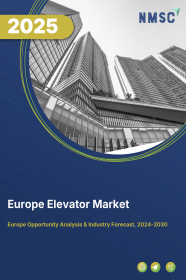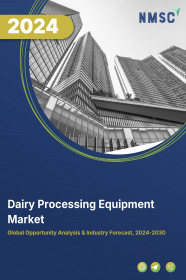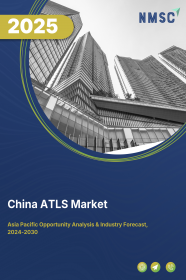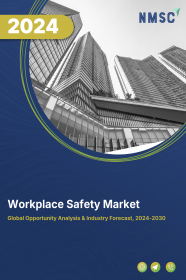
Europe Elevator Market by Type (Passenger elevator, Freight elevator and Others), by Technology (Traction and Hydraulic), by Service (New Installation, Maintenance and Modernization), by Capacity (Less than 1500 kg, 1500 to 2500 kg, 2501 to 4000 kg and More than 4000 kg) by Speed (Less than 1 M/S, Between 1 to 4 M/S and More than 5 M/S), by Deck type (Single Deck and Double Deck), by Designation Control (Smart and Conventional) and Others- Opportunity Analysis and Industry Forecast, 2024 –2030
Industry: Construction & Manufacturing | Publish Date: 15-Feb-2025 | No of Pages: 319 | No. of Tables: 235 | No. of Figures: 200 | Format: PDF | Report Code : CM1611
Market Definition
The Europe Elevator Market size was valued at USD 16.96 billion in 2023, and is predicted to reach USD 24.80 billion by 2030, at a CAGR of 4.5 % from 2024 to 2030. The elevator market represents a dynamic sector encompassing the design, manufacturing, installation, and maintenance of elevator systems. From conventional traction elevators to cutting-edge smart solutions, this market offers a diverse array of vertical transportation choices customized to suit the distinct requirements of various buildings and infrastructure projects. Stakeholders within the elevator market include manufacturers, suppliers, contractors, architects, building owners, and facility managers.
Manufacturers continuously innovate to enhance elevator performance, safety, and sustainability, while suppliers provide critical components and materials necessary for system construction. Additionally, sustainability considerations, including energy efficiency and material recyclability, are increasingly integral to elevator design and operation. They align with broader environmental objectives and sustainable building practices. Thus, the elevator market is a cornerstone of vertical mobility as elevators enhance functionality, accessibility, and sustainability within buildings and urban landscapes worldwide.
The Rapid Urbanization Raises the Demand for Elevators Market
The elevators market is experiencing significant growth driven by rapid urbanization in the region. This demographic shift emphasizes an increasing need for vertical mobility solutions, particularly elevators. As urbanization transforms the landscape of the country, there is a growing imperative for efficient transportation within high-rise buildings, commercial complexes, and residential towers. As cities evolve and expand, the integration of advanced elevator systems becomes crucial to guarantee seamless vertical mobility and improve overall accessibility and convenience for both residents and visitors. Consequently, elevators play a crucial role in facilitating the smooth operation of modern urban environments across Europe.
The Surging Construction Industry Raises the Demand for the Market
The surge in building and construction activities emerges as a primary catalyst driving the expansion of the elevator market. As urbanization continues to reshape landscapes across Europe, there is a growing demand for vertical infrastructure, including high-rise buildings, skyscrapers, and mixed-use developments. This trend is particularly evident in developing economies where rapid urbanization and population growth necessitate innovative solutions to accommodate dense urban populations. Consequently, the construction industry is experiencing a surge in ambitious architectural projects that redefine city skylines and urban environments.
Within these soaring structures, elevators play a crucial role as indispensable conduits of vertical mobility. They efficiently transport occupants and goods between floors, ensuring seamless access to various amenities, residences, offices, and recreational spaces. elevators enhance convenience and optimize space utilization within tall structures, maximizing the value of vertical real estate. Furthermore, the rise of mixed-use developments highlights the versatile nature of elevators, seamlessly linking residential, commercial, and retail spaces within a unified complex, thereby improving accessibility and functionality. As construction activity intensifies to meet the demands of urbanization, elevators emerge as pivotal components of modern infrastructure, further driving the growth trajectory of the elevator market.
The High Initial Cost Associated with the Maintenance Hinders the Market Growth
The significant costs associated with elevator installations, maintenance, and upgrades pose notable challenges to market growth. The initial investment needed for installing elevator systems, especially in buildings not originally designed for such infrastructure, can place a considerable financial burden on building owners and developers. Furthermore, ongoing expenses related to maintenance contracts, which include regular inspections and repairs, add to the overall ownership costs. Moreover, the need for modernization to comply with updated safety standards and improve energy efficiency further compounds the financial strain. These expenditures can be particularly daunting for building owners in regions with limited financial resources or older buildings where retrofitting elevators is complex and costly. Consequently, the heightened costs associated with elevators hinder market expansion, impacting growth prospects across various regions.
The adoption of AI-powered predictive elevator maintenance offers a valuable opportunity
AI-driven predictive elevator maintenance presents a lucrative opportunity within the elevator industry, leveraging AI to revolutionize maintenance and management practices. By analysing data from elevator sensors, AI algorithms proactively detect maintenance requirements, thereby reducing downtime and maximizing elevator operational time. This strategy not only extends the lifespan of elevator components but also enhances safety by preventing unforeseen breakdowns and optimizes resource distribution, leading to significant cost reductions for elevator companies. Additionally, reliable and well-maintained elevators contribute to heightened user satisfaction, thereby enhancing the overall experience for building occupants and visitors. Embracing AI-driven predictive maintenance enables elevator companies to stay competitive and deliver superior service quality in a rapidly evolving market environment.
Germany Holds the Dominant Market Share in Europe elevator Market
In Germany, where urban dwellers constituted 77.8% of the population in 2023, there exists a notable requirement for vertical mobility solutions, notably elevators. As urbanization continues to influence the environment, the necessity for efficient transportation within high-rise buildings, commercial complexes, and residential towers becomes progressively essential.
The clustering of people in urban settings highlights the significance of elevators in enabling convenient and accessible vertical transportation. Given the substantial urban population, there persists a consistent demand for elevators to address the vertical mobility requirements of residents, employees, and visitors alike.
Norway to Witness Substantial Growth in the Europe elevator Market
In Norway, where urbanization and infrastructure development are accelerating, there is a growing demand for the maintenance and modernization of elevators and escalators. Mitsubishi Electric's expansion efforts in Norway align closely with this increasing demand, signalling its intention to capture a significant share of the Norwegian elevator market. By prioritizing the building systems business, Mitsubishi Electric aims to meet the evolving needs of Norway's urban landscape, establishing itself as a prominent player in the country's elevator market. This strategic initiative underscores the company's dedication to delivering innovative solutions and addressing the rising demand for vertical mobility solutions in Norway and throughout Europe.
Competitive Landscape
The Europe elevator market comprises various market players, such as Schindler, Otis Elevator Company, TK Elevator (TKE), KONE Corporation, Fujitec Co. Ltd, Brobeil Aufzuge GmbH & Co. KG, Lift Reith GmbH & Co. KG, Toshiba Corporation, Aufzuge mit Herz GmbH, KOHLER Elevator GmbH and others.
Europe Elevator Market Key Segments
By Type
-
Passenger elevator
-
Freight elevator
-
Others
By Technology
-
Traction
-
Machine Room [MR] Traction
-
Machine Roomless [MRL] Traction
-
-
Hydraulic
By Service
-
New Installation
-
Maintenance
-
Modernization
By Capacity
-
Less than 1500 kg
-
1500 to 2500 kg
-
2501 to 4000 kg
-
More than 4000 kg
By Speed
-
Less than 1 M/S
-
Between 1 to 4 M/S
-
More than 5 M/S
By Deck Type
-
Single Deck
-
Double Deck
By Designation Control
-
Smart
-
Conventional
By Door Type
-
Automatic
-
Manual
By Application
-
Residential
-
Commercial
-
Industrial
By Country
-
UK
-
Germany
-
France
-
Italy
-
Spain
-
Denmark
-
Netherlands
-
Finland
-
Sweden
-
Norway
-
Russia
-
Rest of Europe
REPORT SCOPE AND SEGMENTATION:
|
Parameters |
Details |
|
Market Size in 2023 |
USD 16.96 Billion |
|
Revenue Forecast in 2030 |
USD 24.80 Billion |
|
Growth Rate |
CAGR of 4.5 % from 2024 to 2030 |
|
Analysis Period |
2023–2030 |
|
Base Year Considered |
2023 |
|
Forecast Period |
2024–2030 |
|
Market Size Estimation |
Billion (USD) |
|
Growth Factors |
|
|
Countries Covered |
12 |
|
Companies Profiled |
10 |
|
Market Share |
Available for 10 companies |
|
Customization Scope |
Free customization (equivalent up to 80 working hours of analysts) after purchase. Addition or alteration to country, regional, and segment scope. |
|
Pricing and Purchase Options |
Avail customized purchase options to meet your exact research needs. |
KEY PLAYERS
-
Schindler
-
Otis Elevator Company
-
TK Elevator (TKE)
-
KONE Corporation
-
Fujitec Co. Ltd
-
Brobeil Aufzuge GmbH & Co. KG
-
Lift Reith GmbH & Co. KG
-
Toshiba Corporation
-
Aufzuge mit Herz GmbH
-
KOHLER Elevator GmbH

















 Speak to Our Analyst
Speak to Our Analyst




















